Treasure Trove A Collection of ICSE Poems Workbook Answers Chapter 4 After Blenheim- ICSE Class 10, 9 English
ICSE SolutionsSelina ICSE SolutionsML Aggarwal Solutions
EnglishMathsPhysicsChemistryBiology
Comprehension Passages
Stanza 1 and 2
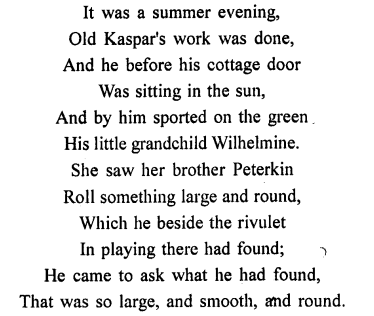
Read the lines given above and answer the questions that follow.
Question 1.
Explain with reference to context.
Answer:
These lines have been taken from the poem ‘After Blenheim’ which is an antiwar poem in the form of a ballad. Robert Southey wrote and published it in 1798. It centers on the most famous battle in the War of the Spanish Succession. An elderly farmer named Kaspar sits in front of his cottage watching his grandchildren, Wilhelmine and Peterkin, at play. Peterkin is rolling an object he found near a stream. He takes it to Kaspar and asks what it is.
Question 2.
Who was playing on the grass near Kasper?
Answer:
His grandchild Wilhelmine was playing on the grass nearby.
Question 3.
What was Peterkin doing?
Answer:
Peterkin was playing beside a small stream.
Question 4.
What did Peterkin find?
Answer:
Peterkin found an object that was large,smooth and round.
Question 5.
Who was Peterkin?
Answer:
Peterkin was Old Kasper’s grandson and Wilhelmine’s brother.
Stanza 3 and 4
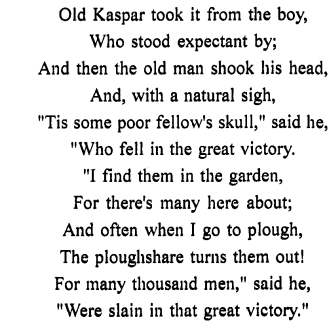
Read the lines given above and answer the questions that follow.
Question 1.
Explain with reference to context.
Answer:
These lines have been taken from the poem ‘After Blenheim’ which is an antiwar poem in the form of a ballad. Robert Southey wrote and published it in 1798. It centers on the most famous battle in the War of the Spanish Succession. The old man, who has found many such objects while ploughing the fields, replies that it is the skull of a soldier who died in the Battle of Blenheim. He tells them that lie found many such skulls as a large number of soldiers had died in the war which was a great victory.
Question 2.
What did Old Kasper do when Peterkin came to him with the object?
Answer:
When Peterkin came to him with the object, old Kasper shook his head and sighed.
Question 3.
What did Kasper say?
Answer:
Kasper said that it seemed to be a skull of some soldier who had died in the great victory of the Battle of Blenheim.
Question 4.
What words show that there were many such skulls to be found there?
Answer:
Kasper comments that:
‘I find them in the garden,
For there’s many here about;” For many thousand men,” said he,
“Were slain in that great victory” which shows that many people had died in the battle.
Question 5.
What does the tone of Kasper’s words suggest?
Answer:
It is evident from Kasper’s answer that he was not upset about the death of thousands in the battle, rather the only thing that concerned him was that it was a great victory.
Question 6.
Why does the poet use a skull?
Answer:
Southey uses a skull, as it is the most unique part of the human body. This makes you recognise that the skull was once part of a human body that was ruthlessly killed, and again emphasises the pointlessness of war.
Stanza 5 and 6
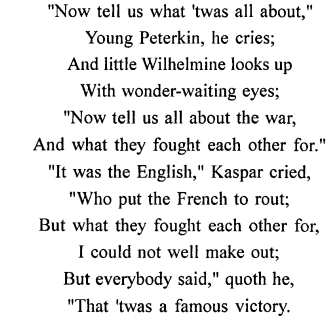
Read the lines given above and answer the questions that follow.
Question 1.
Explain with reference to context.
Answer:
These lines have been taken from the poem ‘After Blenheim’ which is an antiwar poem in the form of a ballad. Robert Southey wrote and published it in 1798. It centers on the most famous battle in the War of the Spanish Succession. Their curiosity aroused, the children ask him about the battle and why it was fought. The English routed the French, he says, in what later generations would call a great and famous victory. However, Kaspar is at a loss to explain the cause of the battle but he is complacent and says that everyone said that it was a great victory and that is all that mattered to him.
Question 2.
Quote the lines that show the children were curious about the battle and its outcome?
Answer:
The lines that show the curiosity of the children are:
“Now tell us what ’twas all about,”
Young Peterkin, he cries;
And little Wilhelmine looks up
With wonder-waiting eyes;
Question 3.
Did the children wonder about the reason for the war?
Answer:
The children asked Kasper as to why was the battle fought. They asked:
“Now tell us all about the war,
And what they fought each other for.”
Question 4.
Name the two opposing sides. Who won?
Answer:
The battle was fought between the English and French. The French were defeated.
Question 5.
Why does Kasper repeat the line ‘twas a great victory?
Answer:
Old Kasper continuously repeats this sentence as this is all he knows about the war. Although it is constantly mentioned that it was a great victory this is not what the poem is saying. Southey is using this phrase to emphasise the exact opposite, that it wasn’t a great victory.
Stanza 7 and 8
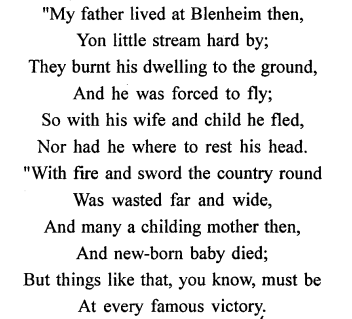
Read the lines given above and answer the questions that follow.
Question 1.
Explain with reference to context.
Answer:
These lines have been taken from the poem ‘After Blenheim’ which is an antiwar poem in the form of a ballad. Robert Southey wrote and published it in 1798. It centers on the most famous battle in the War of the Spanish Succession.He does know that thousands died in it—not only soldiers but also townspeople, including children. In fact, the fields were littered with corpses. But such terrible consequences are part of war, he says. They do not negate the glory of the victory.
Question 2.
What happened to Kaspar’s family in the war?
Answer:
In the war ,Kaspar’s house was burnt down and his father had to flee alongwith his wife and children.
Question 3.
What does Kasper’s attitude signify?
Answer:
Old Kaspar unquestioningly accepts the loss of innocent women and children in the Battle of Blenheim as one of the prices of the glorious victory. His complacent attitude is not unlike that of modern politicians who dismiss the deaths of innocent civilians in arenas of war by referring to them with the impersonal phrase “collateral damage.”
Question 4.
Explain the lines:
“With fire and sword the country round
Was wasted far and wide,’
Answer:
Old Kaspar tells his grandchildren that due to the war the entire countryside was ravaged. Many people were killed by the sword and their houses burnt to the ground.
Question 5.
Kaspar describes the horrors of war but how can his attitude be described?
Answer:
Kaspar can describe what the war was like at Blenheim, but he cannot explain why the belligerents went to war. Nor does he seem curious about the causes. All that matters to him is that Austria and England won a glorious victory. He seems complacent and uncaring about the inhumanities of war ,all that he is concerned with is that it was a great victory for his country.
Stanza 9, 10, and 11
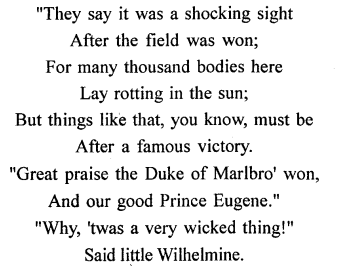
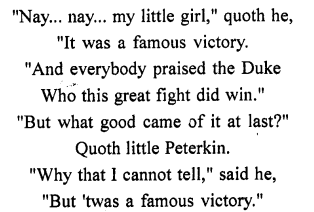
Read the lines given above and answer the questions that follow.
Question 1.
Explain with reference to context.
Answer:
These lines have been taken from the poem ‘After Blenheim’ which is an antiwar poem in the form of a ballad. Robert Southey wrote and published it in 1798. It centers on the most famous battle in the War of the Spanish Succession.
Wilhelmine then comments that the battle was “a wicked thing,” but Kaspar tells her she is wrong. “It was a famous victory,” he says. Peterkin asks what good came of the fighting. Kaspar says he does not know, but adds, ” ’twas a famous victory.” The narrator does not know why the battle was fought, why thousands died, why his father’s cottage was burned or what good came of it but ironically it was a famous victory.
Question 2.
How does kasper justify the thousands of death in the war?
Answer:
Old Kaspar unquestioningly accepts the loss of innocent women and children in the Battle of Blenheim as one of the prices of the glorious victory. His complacent attitude is not unlike that of modern politicians who dismiss the deaths of innocent civilians in arenas of war by referring to them with the impersonal phrase “collateral damage.”
Question 3.
How does the poet describe the scene on the field after the battle?
Answer:
The poet poignantly describes the horrible and devastating effects of the war when he write:
“They say it was a shocking sight After the field was won;
For many thousand bodies here Lay rotting in the sun;
Question 4.
What is Wilheinien’s reaction to the description of the war?
Answer:
Wilhelmine is upset by the horrific effects described and comments that the battle was “a wicked thing,” but Kaspar tells her she is wrong. “It was a famous victory,” he says. Peterkin asks what good came of the fighting. Kaspar says he does not know, but adds, ” ’twas a famous victory.
Question 5.
How do the skulls symbolize the theme in “The Battle of Blenheim”?
Answer:
The skulls show how serious the loss of life was. They are treated without respect, just as the reasons for the war are no longer remembered. They represent the grandfather’s commitment to the cause of freedom.
Question 6.
In “The Battle of Blenheim,” why are Wilhelmine’s words “twas a very wicked thing” ironic?
Answer:
Wilhelmine’s words “twas a very wicked thing” are ironic because although she innocently is telling the truth, but her grandfather says she is wrong. She, a child will never understand issues of war and death but the poet makes her his mouthpiece to comment on war.
Project
Question 1.
Define the following terms from the poem: rivulet, plough share (plowshare), yon, and childing.
Answer:
A rivulet is a small stream suggesting a beautiful and calm environment far removed from
the horrors of war. A plowshare is the main cutting blade of a plough, behind the coulter,
Question 2.
Research the Battle of Blenheim. Then write an essay defending Wilhelmine’s position that the battle was a “wicked thing” or Kaspar’s position that it was a “great victory.”
Answer:
The battle was fought near the village of Blenheim, in Bavaria, on the left bank of theriver Danube, on August 13, 1704. The French and Bavarians, under Marshall Tallard and Marsin, were defeated by the English and Austrians, under the Duke of Marlborough and Prince Eugene. After thousands of casualties, and vast civilian destruction, the battle ended. It was arguably among the most important battles of the 18th century, and the turning point of the War of the Spanish Succession.
Southey uses a skull, as it is the most unique part of the human body. This makes; you recognise that the skull was once part of a human body that was ruthlessly killed, and again emphasises the pointlessness of war
After finding the skull, Peterkin immediately asks what it is. Kaspar tells him that it is part of the remains of a soldier who died at Blenheim. Wilhelmine then asks Kaspar to describe the war and explain its causes. Kaspar can describe what the war was like , at Blenheim, but he cannot explain why the belligerents went to war. Nor does he seem curious about the causes. All that matters to him is that Austria and England won a glorious victory.
Old Kaspar unquestioningly accepts the loss of innocent women and children in the Battle of Blenheim as one of the prices of the glorious victory. His complacent attitude is not unlike that of modem politicians who dismiss the deaths of innocent civilians in arenas of war by referring to them with the impersonal phrase “collateral damage.”
Question 3.
Why does the poet use repetition in the poem?
Answer:
The poet uses repetition as at the end each verse he repeats the ironic saying:“But ‘twas a famous victory.” Old Kasper continuously repeats this sentence as this is all he knows about the war. Although it is constantly mentioned that it was a great victory this is not i what the poem is saying. Southey is using this phrase to emphasise the exact opposite, that it wasn’t a great victory. It is one of Southey’s most famous poems. The internal repetition of but ’twas a famous victory juxtaposed with the initial five lines of each stanza, establish that the narrator does not know why the battle was fought, why thousands died, why his father’s cottage was burned. The often-quoted closing lines are:
“But what good came of it at last?”
Quoth little Peterkin.
“Why that I cannot tell,” said he,
“But ’twas a famous victory.”
Question 4.
Can it be argued that this is an anti- war poem?
Answer:
The poet uses imagery to describe the soldiers in war who die fighting for the survival of kingdoms. Is this what human life has come to as a result of war? Worth nothing. The poet’s feelings about war is that they are catastrophically phenomenal, and leave hundreds of people without their homes, and without each other, completely destroyed. Wars affect everyone on a large scale. In ‘After Blenheim’, the poet repeats that the Battle of Blenheim was a huge and great victory for the English. He is saying that he believes that wars always end for one side in a great victory, usually achieved for a good cause but for the other side they are a total failure and the costs are huge. The poet poignantly describes the after effects
“They say it was a shocking sight
After the field was won;
For many thousand bodies here
Lay rotting in the sun;’
Wilhelmine even comments that the battle was “a wicked thing,”
Question 5.
Explain and discuss the themes in the poem.
Answer:
The poet has artfully woven in diverse themes into the poem. He speaks of Man’s Inhumanity to Man. War represents the worst form of human behavior and its cruelty to our fellow beings.: The skull Peterkin finds, as well as those that Kaspar regularly unearths while plowing, are mute testimony to the truth of “Man’s inhumanity to man” , a phrase originated by poet Robert Burns. The poem implies that the perpetrators of war cannot or will not suppress wayward ambitions that provoke a violent response. The children—as yet uncorrected by adult thinking—readily perceive war for what it is.
The poet also hints at Kaspar’s lack of curiosity as opposed to curiosity depicted by the children. After finding the skull, Peterkin immediately asks what it is. Kaspar tells him that it is part of the remains of a soldier who died at Blenheim. Wilhelmine then asks Kaspar to describe the war and explain its causes. Kaspar can describe what the war was like at Blenheim, but he cannot explain why the belligerents went to war. Nor does he seem curious about the causes. All that matters to him is that Austria and England won a glorious victory.
Kaspar displays a sense of complacency in the face of the horrors of war. He unquestioningly accepts the loss of innocent women and children in the Battle of Blenheim as one of the prices of the glorious victory. His complacent attitude is not unlike that of modem politicians who dismiss the deaths of innocent civilians in arenas of war by referring to them with the impersonal phrase “collateral damage.”
Extra Questions
Question 1.
What tells the reader the serene atmosphere about old Caspar’s home.
Answer:
The seremne atmosphere about Kaspar’s home is conveyed by the fact that he was sitting relaxing in the sun and his grandchild was playing on the grass nearby.
And he before his cottage door
Was sitting in the sun,
And by him sported on the green
His little grandchild Wilhelmine.
Question 2.
Why were the children confused about their grandfather’s claims about the war?
Answer:
The children were confused becuse he could not explain to them whwhy the war took place and what good resulted from it. All he could say to them was that it was a great victory
Question 3.
Whose family has been referred to earlier in the context?
Answer:
Old Kaspar’s family has been referred to. His house was burnt down in the war and his family had to flee.
Question 4.
Name Kaspar’s grandchildren? Why did the boy come home?
Answer:
Wilhelmine and Peterkin were the grandchildren. Peterkin came home as he had found a skull while playing.
Question 5.
What made the old man shake his head and sigh?
Answer:
The old man shook his head in sadness for the people who had died in the war.
Question 6.
What was the great victory? Who had won the victory?
Answer:
The Battle of Blenheim was a great victory and it was won by Austria and England.
Question 7.
Later, too, the old man uses the expression famous victory? Why?
Answer:
Old Kasper continuously repeats this sentence as this is all he knows about the war. Although it is constantly mentioned that it was a great victory this is not what the poem is saying. Southey is using this phrase to emphasise the exact opposite, that it wasn’t a great victory.
Question 8.
What do you think of the old man’s point of view?
Answer:
Kaspar can describe what the war was like at Blenheim, but he cannot explain why the belligerents went to war. Nor does he seem curious about the causes. All that matters to him is that Austria and England won a glorious victory. Old Kaspar unquestioningly accepts the loss of innocent women and children in the Battle of Blenheim as one of the prices of the glorious victory. His complacent attitude is not unlike that of modem politicians who dismiss the deaths of innocent civilians in arenas of war by referring to them with the impersonal phrase “collateral damage.”
Question 9.
Explain the expression, ‘wonder-waiting eyes.’
Answer:
The expression, ‘wonder-waiting eyes.’ refers to the surprised and questioning attitude of the grandchildren who wanted their grandfather to explain to them the reasons for the war and what good was achieved by it.
Question 10.
Why is the word ‘ cried’ used by the poet in the line, ‘It was the English, Kaspar cried’?
Answer:
The word cried is used ironically to tell the reader that although Kaspar keeps repeating that it was a famous victory won by the English yet he in his heart was sad at the futility and destruction of the war.
Question 11.
How was the great victory a personal tragedy for Kaspar?
Answer:
Kaspar’s house was burnt down and his father had to flee with his wife and children.
Question 12.
How was the country affected by the war?
Answer:
In the war not only did the soldiers die but many innocents, children and pregnant woman were also killed. Houses and fields of crops were burnt and people had to flee their homes to save themselves.
Question 13.
Do you agree with his justification of the war? Why/ why not?
Answer:
No I do not agree. War is a curse. War represents the worst form of human behavior and its cruelty to our fellow beings.: The skull Peterkin finds, as well as those that Kaspar regularly unearths while plowing, are mute testimony to the truth of “Man’s inhumanity to man”, a phrase originated by poet Robert Bums. The poem implies that the perpetrators of war cannot or will not suppress wayward ambitions that provoke a violent response. The children—as yet uncorrupted by adult thinking—readily perceive war for what it is.
Question 14.
There are two pauses when Kaspar tells Wilhelmine in the last stanza that it was a famous victory. Nay … nay…my little girl, quoth he.What do these pauses show?
Answer:
These pauses show that Kaspar was doubtful about the greatness of the war and the victory . But he was so used to believing blindly the popular belief that it was a great victory that he did not refute it although in his heart he did not believe his own words.
Question 15.
Comment on the contrasted viewpoints in the poem.
Answer:
The poet makes the children oppose Kaspar’s viewpoint that it was a great victory. Wilhelmine says the it was a very wicked thing and Kaspar refutes it. Dialogue is used to bring out the clash in the two viewpoints. The writer keeps it impersonal and like in any ballad the suspense is maintained in the tale. The open-ending makes it truly objective and powerful simultaneously in its ant-war stance.
For More Resources
